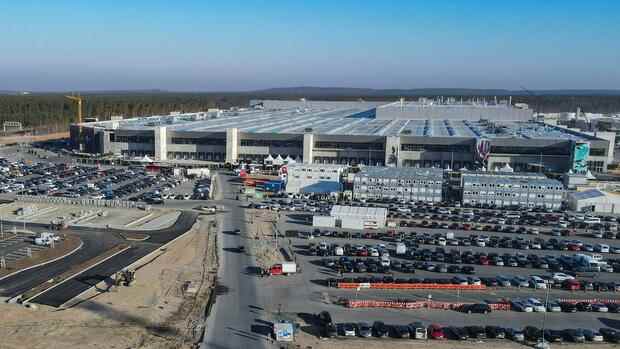CEO Elon Musk came to Grünheide near Berlin to hand over the first 30 copies of his Model Y to the new owners. Musk said the factory is a big step towards solving the problem of climate change. The 50-year-old also tweeted “Thank you Germany!!” and provided his short message with four federal flags.
At the start of the plant, Chancellor Olaf Scholz and Economics Minister Robert Habeck also praised the six billion investment. “Germany can be fast,” said Scholz. “In terms of industry, the East is at the forefront.”
With the factory, after only two years of construction and many preliminary approvals until the final approval at the beginning of March, a new automotive location was created in eastern Germany. The project is regarded as a model – also in terms of construction and approval times. The factory is close to the capital’s BER airport, which opened in 2020 after a nine-year delay.
Top jobs of the day
Find the best jobs now and
be notified by email.
Habeck said in Grünheide: “Of course, this short factory construction time can also be a bit of a requirement for Tesla’s pace in other areas.” He works on it 24 hours a day, seven days a week.
The minister hits the nerve of the economy. Siegfried Russwurm, President of the Federation of German Industries (BDI), also said: “The pace at Tesla must serve as a model for investment projects in Germany.”
Habeck pays tribute to “corporate daring culture”.
The Federal Ministry of Transport confirmed the plans of the traffic light coalition to halve the duration of planning and approval procedures. The Greens economic politician Dieter Janecek emphasized: “A significant simplification of approval and planning procedures is absolutely urgent.”
The Vice President of the SPD Economic Forum, Matthias Machnig, warned that the revision of the previous planning and approval law should not only have a “cosmetic character”. “The right must become an enabling right.”
The applicable licensing law is not without its pitfalls. For example, Tesla originally wanted to have the first cars roll off the assembly line in Grünheide last summer. But the approval process was delayed, partly because Tesla added a battery factory to the building application. The state of Brandenburg finally approved the project on March 4th. The car factory is already there, built at your own risk over almost 20 early registrations.
Tesla’s willingness to take risks also commands respect from Economics Minister Habeck. “If the permits hadn’t come, they would have had to dismantle. It’s a different corporate daring culture – but it worked,” he said.
BDI President Russwurm called on the federal government to start a “massive acceleration” of the approval process by Easter. Finance Minister Christian Lindner (FDP) announced “presentable results” in the first half of the year after a cabinet meeting in January.
>> Read also: Record speed despite setbacks – How Tesla and Brandenburg outsmarted the bureaucracy
Russwurm also explained the need for action with the current discussion about reducing energy imports from Russia. Because of the urgently needed faster conversion of the energy supply in Germany, there will be a “huge approval marathon” for infrastructure and industrial projects. “The federal and state governments must achieve much more speed than before in planning and approvals to ensure security of supply and the desired independence from Russian energy supplies,” warned the BDI President.
Habeck said becoming independent of Russian oil is not trivial. “To show that we can not only replace oil with oil, but we can also do electricity, is of course a nice symbol on this day,” said the Green politician with a view to Tesla.
Impressed by Tesla’s willingness to take risks: Economics Minister Robert Habeck.
(Photo: Reuters)
In this context, Russwurm praised the intensive support of the settlement by the Brandenburg state government. This has “considerably” accelerated the approval process. “German industrial companies would like this kind of support for every approval process in all federal states.”
Tesla starts with 3000 employees
Brandenburg’s Prime Minister Dietmar Woidke (SPD) explained: “We have proven that even with a somewhat complicated German approval law, such a large investment can be realized within little more than two years.”
With the handover of the cars to the first German customers, the Model Y Performance celebrates its German and European premiere at the same time.
The Gigafactory Berlin-Brandenburg is the fifth major Tesla location worldwide, alongside the production facility in Fremont, California, and the gigafactories in Reno (Nevada), Buffalo (New York) and Shanghai (China). After the announcement in November 2019, construction of the factory started as early as spring 2020. Just about two years later, the factory was officially approved and has started production of the Model Y all-electric compact SUV.
In a first step, Tesla is planning up to 500,000 cars a year. According to the company, at full capacity, up to 12,000 employees will produce cars, battery cells, batteries, electric motors, plastic parts, seats and axles, among other things.
More than 3000 employees have already started work in the factory. Thousands more employees are to be hired in the coming months.
More: Tesla and Brandenburg – How a tweet became the most important industrial project in East Germany
